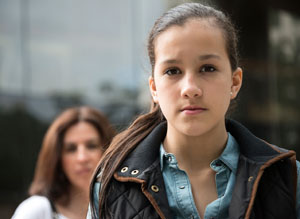 “My 16-year-old wants Instagram and I won’t let her have it. Is that bad?”
“My 16-year-old wants Instagram and I won’t let her have it. Is that bad?”
It was an honest question from a mom after one of my recent parent workshops.
“Why don’t you let her have Instagram?”I asked.
“Well… it’s social media, and that’s bad… right?” She replied indecisively.
“When she’s 18 and she goes off to college, do you think she’ll get it?”
“Yeah. Absolutely.”
I decided to respond with a rhetorical question: “And then she’ll have to navigate the world of social media on her own?”
This mom isn’t alone. Parenting the smartphone generation isn’t easy. We want to protect them from many of the potential dangers that truly exist, but the question we need to ask is, “Will they ever learn if I keep making all the decisions for them?”
Where will your kids adopt their values from, our bonding time with them, or our boundaries we impose?
Think about it. Because it’s probably the biggest question Christian parents struggle with today—raising kids in the truth when they’re surrounded by lies. And the go-to response for many panic-stricken parents is to “tighten the grip” to protect their kids. Tighten up on the boundaries.
One problem.
It doesn’t work.
No, I’m not telling you to let your kids do whatever they want. Far from it. I’m just emphasizing two truths:
1. We can’t protect our kids from everything!
We can buy every porn filter, phone monitoring software, router based filtering systems… or even ban our kids from all entertainment media! But if they have friends, play sports, or go to school (yes, even Christian schools)… they will be exposed to enticing imagery and ideas. All the parental controls in the world aren’t substitutes for conversations about truth.
2. Our kids glean more from our conversations than they do from our rules
Which do you think has a bigger impact on our kids’ lives? Our banning them from using Instagram, or our conversation where we asked them:
“When it comes to posting pics, what kind of pics do you think come back to harm young people today?”
Here’s the scary truth about the boundaries many of today’s parents impose on their kids. They think rules and restrictions allow them to parent in autopilot mode. Newsflash. There is no autopilot in parenting. Parenting takes a lot of work.
It’s waaaaaaaay easier to just tell our kids “no R-rated movies, but PG-13 is okay,” than to have a conversation where we ask, “Do you think you should watch this?”
Conversations are where our kids glean wisdom and values.
And here’s the kicker. When I surveyed hundreds of parents for my new book, If I Had a Parenting Do Over, asking them about their biggest parenting regret… the overwhelming majority said it was in the area of bonding. Less than 2 percent of parents said they wished they had imposed more boundaries.
Don’t underestimate the impact of bonding.
For more about this struggle, take a peek at the brand new article I just posted on our TheSource4Parents.com “Parenting Help” page, Bonding or Boundaries: Which do you lean toward?



 Follow
Follow
Again, I ask what is considered lies?
Lies refers to when the world offers people temporary fixes to a longterm problem.
– if you’re depressed, get drunk and forget about your worries.
– have sex with whoever you want
– do whatever feels right at the moment
(I think I just summarized many of the top songs on the charts right now)
Let me know if you’d like to talk about any of these individually. I’d be happy to.
What would your response have been and what would others response have been if you replaced “Snapchat” with “Instagram” in this article?
Snapchat and Instagram are indeed two different social media apps, each bringing a certain perception to the table. Insta was a little more innocent (not that kids couldn’t post inappropriate pics), where Snapchat’s perceived ephemeral (temporary) nature always made it a little more edgy… because the pics disappear, right? (a little more to it than that. See here: https://jonathanmckeewrites.com/archive/2016/10/05/should-teens-have-snapchat.aspx) But now that Insta is also doing “stories”… it also has a perception of, “well… this will only be up for 24 hours.” Either way, it’s conversations parents need to have with their kids.